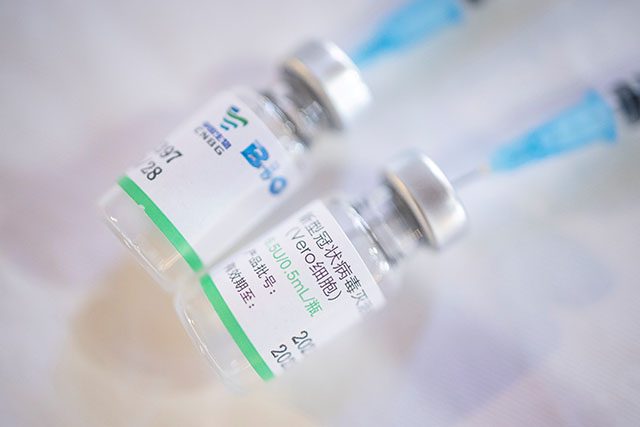
As the local Food and Drug Administration announces granting Sinopharm an emergency use authorization for its coronavirus vaccine, concerns on its efficacy were raised following recent reports on its performance in other countries.
It was the Department of Health that applied for an EUA for the China-made vaccine.
Executive Order 121 allows the drug regulator to issue an EUA for COVID-19 drugs and vaccines, wherein an application can be submitted by “the industry or government agency concerned, such as the national procurer or the public health program implementer.”
The FDA is an attached agency of DOH.
The health department said that it would apply for Sinopharm’s EUA approval after the World Health Organization cleared it for emergency use last month.
“Secretary Francisco Duque III wrote to FDA on May 20 that they were willing to accept donations for Sinopharm coming from China,” FDA director general Eric Domingo was quoted as saying in Filipino.
Duque said that his agency had sought an EUA so that the country will no longer have to return the donated Sinopharm jabs to Beijing before.
Palace said that a separate EUA “would have to be given to the entity” who will import other batches of Sinopharm.
“Ang pagkakaintindi ko po, it was granted for the 1,000 donated,” President Rodrigo Duterte‘s spokesperson said, referring to the recent EUA received by the China-made vaccine.
Sinopharm has been administered to Duterte and the Presidential Security Group before it was granted approval by the local regulatory agency.
Following FDA’s announcement, some Filipinos shared links to recent reports involving the China-made vaccine.
“Well they approved something that some countries are now worrying about,” a Twitter user said in response to a post about Sinopharm, attaching a report by Forbes.
Another online user shared a screengrab of a news item on countries giving third doses of Sinopharm to their citizens following reported concerns on its efficacy.
— jana (@alphaomega07) June 7, 2021
On June 3, Forbes reported that Bahrain has planned to offer booster shots of Pfizer to those already fully immunized with Sinopharm.
“While a government spokesperson told Forbes the vaccine offers a similarly high level of protection as other vaccines, the policy change comes after the country already started offering Sinopharm boosters while battling a Covid surge five times as deadly as India’s despite having around 50% of its population fully vaccinated,” it said.
“Several other highly vaccinated countries that deployed the Sinopharm shot heavily are also experiencing severe outbreaks, with the UAE and the Seychelles both considering or implementing booster programs of their own,” the report said.
A Reuters report also noted that the United Arab Emirates has been offering third shots of Sinopharm “after it was discovered the shot had not created enough antibodies for some recipients.”
In another report by CNBC, Seychelles, which has reportedly immunized 60% of its population, saw a surge in COVID-19 cases but an official said this could be due to public complacency as well.
“Over the last few months, after vaccination, people have seen that anybody getting infected is not getting seriously sick, nobody is dying, nobody is getting a lot of complication,” Sylvestre Radegonde, the minister for foreign affairs and tourism, was quoted as saying.
A report said 57% of fully-vaccinated Seychelles residents received Sinopharm while 43%, which comprised of those above 60 years of age, took Covishield, the AstraZeneca vaccine made in India.
What WHO says
A study published on the Journal of the American Medical Association last month said that two vaccines made by Sinopharm are about 73% and 78% effective.
There are two versions of the vaccine—one developed by Wuhan Institute of Biological Products and the other, by the Beijing Institute of Biological Products.
WHO approved the jab developed by the latter, which it said carried a 79% vaccine efficacy.
“On the basis of all available evidence, WHO recommends the vaccine for adults 18 years and older, in a two-dose schedule with a spacing of three to four weeks. Vaccine efficacy for symptomatic and hospitalized disease was estimated to be 79%, all age groups combined,” it said on its report.
“Few older adults (over 60 years) were enrolled in clinical trials, so efficacy could not be estimated in this age group. Nevertheless, WHO is not recommending an upper age limit for the vaccine because preliminary data and supportive immunogenicity data suggest the vaccine is likely to have a protective effect in older persons,” WHO added.
The United Nations agency said that apart from assessing Sinopharm’s quality, safety and efficacy, it has also conducted on-site inspections of the production facility.









